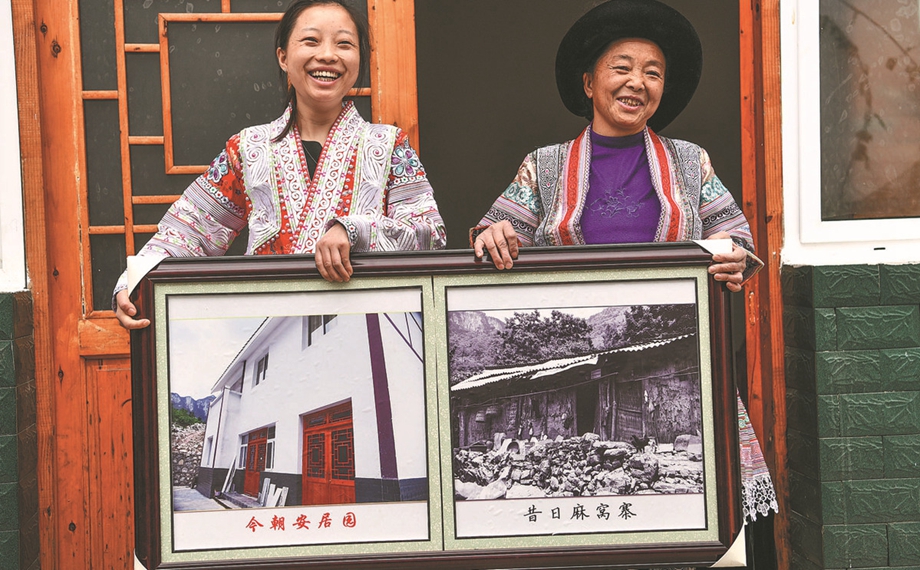China's success built on Party leadership

A mother and daughter from the Miao ethnic group show the contrast between their old and new homes after they were relocated in the village of Huawu, Guizhou province, on Feb 20. They are among the many beneficiaries of China's poverty-alleviation efforts. [YANG WENBIN/XINHUA]
Unique strengths put nation on path to historic transformation, experts say
China's economic success over the past few decades has underscored the leadership approach of the Communist Party of China and its unique ability to effectively blend economic and political systems.
The 100th anniversary of the birth of the CPC on July 1 marks a significant occasion for the country and the world, both of which have been shaped by the Party's growth, longevity and policies in ways that would have been almost unimaginable a century ago.
"The most important and greatest achievement in the past decades is the lifting of hundreds of millions from poverty," said David Lee Kuo Chuen, a professor at the Singapore University of Social Sciences. This contribution to humanity is historic, he added.
Lee said the economic policies of China have demonstrated their success in spurring economic development. These policies have helped lift more than 850 million people out of poverty over the past four decades, according to the World Bank.
The Party, led by General Secretary Xi Jinping of the CPC Central Committee, will enter its second century with more than 95 million members-compared with little more than 50 when it was founded a century ago in Shanghai.
Particularly over the past few decades, the CPC has overseen China as it transformed its economy, generated unprecedented wealth and elevated more people out of poverty than any other country in history all while creating a manufacturing and innovation powerhouse and driver of globalization.
What China has accomplished over the past few years is also unique.
"China under the CPC has accomplished and is challenged by the unprecedented phenomenon of propelling prosperity and economic development," said Thitinan Pongsudhirak, professor and director at the Institute of Security and International Studies at Chulalongkorn University in Thailand.
As it enters its second century in a position of strength and leading a stable and economically strong country, the CPC and its leadership are keenly aware that China does not exist in a bubble.
Speaking at the Boao Forum for Asia Annual Conference 2021 on April 20, President Xi highlighted this understanding by repeating calls to safeguard the United Nations-centered international system and "preserve the international order underpinned by international law".
"Humanity is facing growing governance deficit, trust deficit, development deficit, and peace deficit," Xi said. "Much remains to be done to achieve universal security and common development.
"We will follow the principles of extensive consultation, joint contribution and shared benefits, and champion the philosophy of open, green and clean cooperation, in a bid to make Belt and Road cooperation high-standard, people-centered and sustainable."
Over time, the CPC has adapted its approach to changing conditions both domestically and globally, something that few governing parties have managed to do effectively.
"The CPC showed its flexibility in adapting market orientation from 1978 onwards, the willingness to retool the Chinese economy when State-owned enterprises had to be retrenched in the lead-up to World Trade Organization membership, government-led efforts in making conditions suitable for technological development while attracting foreign direct investments for technology and know-how," said Lim Tai Wei, an associate professor at the National University of Singapore. "Economic growth in China is crucial to the past, current and future political continuity of the CPC."
It is a system of socialism with Chinese characteristics that has a market-oriented economic approach and is a defender of global free trade, said Lim. "The government's stay in power rides on its ability for economic development, poverty alleviation, ability to tap into free markets and efficient mobilization-put to demonstrative use in coping and managing the pandemic."
Economic successes are a key part of the foundation upon which the CPC's long stay in governance is built.
"They provide the bedrock of social and political stabilities for CPC governance. Their development reinforced quantitatively the governance hand of the CPC," said Lim. "The growth of a large middle class helped a large number of the population to become stakeholders in the economy."
Thitinan from Chulalongkorn University said the State-owned economy plays a leading role in China's economy, and the CPC "has left enough room at home for indigenous innovation and dynamic competition".
In many ways, the growth of China "has confounded academic theorists of modernization". This is in part because "the CPC allows competition and merit-driven outcomes within itself", Thitinan said. "I think this has been the key to its success," the academic said.
[page]

Passengers at Guangzhou South Railway Station have their health code status checked by scanning ID cards on June 16. The newly-introduced system can also automatically obtain vaccination and nucleic acid test results. [LU HANXIN/XINHUA]
Second century
As it enters its second century, one high-profile area of focus for the CPC is to extend its economic successes beyond its borders. President Xi launched in 2013 the country's signature Belt and Road Initiative.
One aim of the BRI is to continue facilitating globalization, creating a global network from China through neighboring economies in Southeast Asia and out to every continent in the world.
"I think of the BRI in the lens of China's way of communicating its intentions to its neighbors, specifically to create a perception that China's intention is to find areas for mutual benefit and mutual cooperation," said Robin Michael Garcia, president and CEO at WRN Research in Manila.
"Seen in this way, the BRI is a way of communicating reassurance …the success of which is varied depending on many domestic factors in these societies," said Garcia, who is also an assistant professor of political economy at the School of Law and Governance at the University of Asia and the Pacific in the Philippines. The Philippines signed up to the BRI in 2018.
The benefits of the BRI are stretching far beyond Asia and are having an impact in countries in Europe, Africa and the Americas.
"In its relatively short history, the BRI has already had profound material and principled impacts on the world," said David Castrillon, a Sinologist and research professor at the School of International Relations at Externado University in Colombia.
"Materially, reports by credible institutions like the World Bank have shown the initiative to have positive impacts on poverty reduction, jobs, trade and physical connectivity, to name a few," Castrillon said.
"More importantly, as an initiative open to all countries, the BRI proves that it is through joint action, not divisiveness and petty alliances, that we can achieve shared development."
Another key focus for the CPC over the past few years has been efforts to tackle corruption.
"They appear to have been welcomed by many Chinese people and have created an environment and culture that discouraged corruption," said Lim from the National University of Singapore.
There has been a fair amount of research into the impact of the country's anti-corruption campaign and systemic building.
Before the anti-corruption campaign was initiated, promotions of some local officials were influenced by corrupt exchanges. Such exchanges "eroded the internal order of the Party" and hurt stability, said Lu Xi, of the Lee Kuan Yew School of Public Policy in Singapore.
"The massive anti-corruption campaign is necessary not only because the Party's image is improved, but more importantly, it restores the Party's internal discipline," said Lu. "In hindsight, the anti-corruption campaign has made the CPC more united in dealing with the global tensions today."
Ultimately, unprecedented economic growth has emerged as a key bedrock of the foundation upon which the success of the CPC is built. In particular, since 1978, China's economy has grown by orders of magnitude.
China's GDP topped 100 trillion yuan ($15.4 trillion) in 2020, a far cry from the 367.9 billion yuan recorded in 1978 when the country began opening up its economy.[page]

Chinese and Filipinos take part in a groundbreaking ceremony for the Kaliwa Dam project in Rizal Province, the Philippines, on Tuesday. It is expected to be completed by June 2025. [ROUELLE UMALI/XINHUA]
On track
China is now on track to become the largest economy in the world before the end of the decade.
In a report it released in December, the Centre for Economics and Business Research in the United Kingdom said the total value of the Chinese economy measured in dollars could top that of the United States by 2028, about five years earlier than originally expected. China was just about the only major economy to record growth last year and is poised to lead global growth this year.
"China has shown strong growth in the first quarter at 18 percent. It will become an engine of growth for the world. This puts China in a strong position for economic recovery," said Lim. "Thus, it is likely to shore up domestic demand with internal circulation policy while trying to open up new markets overseas as part of its dual circulation policy."
Dual circulation views the domestic market as the mainstay and the domestic and foreign markets reinforce each other.
Rarely has the importance of a rebound to growth been as significant as this year. As with almost all countries around the world, one immediate challenge for the CPC is leading the recovery from the economic fallout of the COVID-19 pandemic. China's policies proved effective in limiting the spread and economic impact of the novel coronavirus and getting its economy back onto a growth footing.
The CPC policies that have powered China's growth over the past few decades should help the country deal with any immediate challenges.
"The CPC has prioritized economic growth in its five-year plans and it has successfully implemented its policies through various facets of Chinese society," said Andrew Delios, a professor and vice-dean of MSc Programs at the National University of Singapore Business School.
"Where China's success stands out from other great growth stories, is that the leadership has been agile and responsive to the changes that have occurred in China's economy in the past 30 years, which is something that not all other economies have done well.
"The CPC has been central to the economic growth of China. There is no debate about this point," Delios said. "The CPC has been the leader of China's economy and its society and bears ultimate responsibility for the successes and failures therein. The economic story has been a success story in China."
Doris Yu in Hong Kong contributed to this story.